Endorphin flow mechanics on the example of three space games

The player likes to get more than to lose.
When GameDev need to take into account this wonderful feature of the psyche. I will illustrate with three games: the wonderful Faster than Light (born on the PC), the initially popular Tablet Out There and the Galaxy Trucker, which came from the desktop world.
')
None of these games can be saved.
Faster than Light
In FTL, you run away from an evil fleet with important information. The goal - to get to their imperial base, to take the last battle. The whole gameplay is subordinate to this: you travel across sectors, manage the crew on the ship and the ship itself, visit different systems and expect adventure in each (often ending in a battle between two ships).
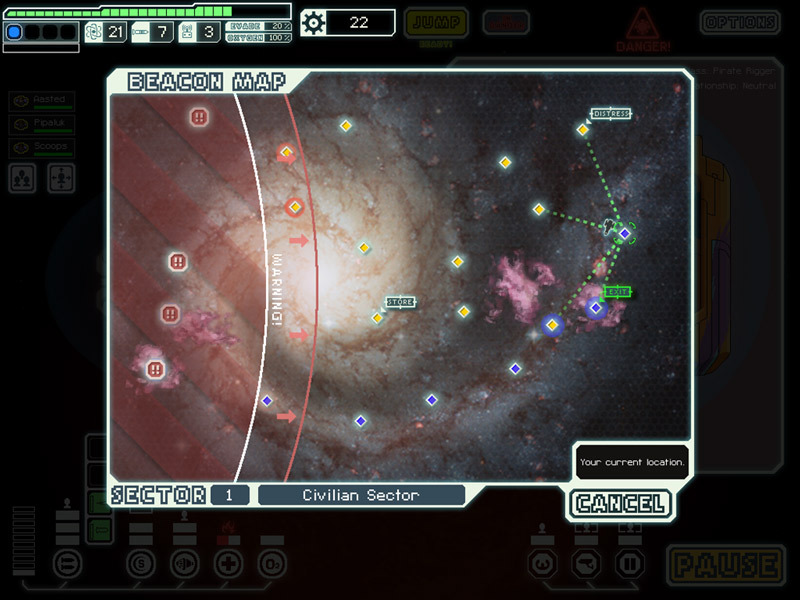
The red border moves every turn.
At the beginning of the game, your ship resembles an unfinished trough full of holes: as a rule, one layer of the shield, the minimum of necessary systems, a weak weapon. As you travel, you will buy new guns, after each battle - to collect debris and make upgrades of them all on the ship. Most likely, you will get a team of bars, rescued capsules and just as a result of random meetings. In addition to the main quest, you usually have three or four subsidiary ones - for example, to find an imperial stealth spaceship or to make some important weapon for this ship.
All gameplay you see constant progress and movement. A continuous stream of endorphins is provided: first you learn to fly, then you unlock the ship behind the ship, then you understand the essence of different strategies - and, finally, having passed all the achievements, received even the most exotic ships and defeated the boss on the highest difficulty without upgrading the shield, you decide that's enough.
You can go back and play like in a sandbox - the content will be repeated, but still, thanks to randomization, it is quite interesting to play on hardcore. At least, on the road - that's it.
The game party itself resembles experience with a rat and a lever that triggers electrodes in the center of pleasure in efficiency. Actually, as we know, scientists got to this experience of a rat not in the center of pleasure itself, but in the center of expectation of this pleasure. So, with each leap into the new FTL system, you are waiting for something good: it can be a cool gun, a good reward, or just a scattering of useful scrap metal. You know that each new leap is a progress, and you wait for it with joy. It is clear that the game has evolved far more than one year, and everything there is already just licked almost to the ideal.
Out there
The plot is this: you find yourself in an unknown sector of space on an earthly ship (trough by local standards), and are trying to get to a certain point at the other end of the sector. The mechanics are similar to the previous one: you have a ship for upgrades, jumps between systems, random events in them and the final test.
And here begins the global difference in feelings from the gameplay. If in FTL you even go around the ship after a difficult battle, patch holes in it, re-pump oxygen into the compartments, extinguish fires and heal the crew, and then upgrade and move on, in Out There real cognitive problems with resource management begin.
In FTL, all resources are stored literally in the interface, they are not visible on the ship. Air does not need to be taken into account, rockets and fuel are just a number in the status bar at the top, you can fit as many modules onto the ship as the design allows. But the ship OT:

Here, each slot is either a place for a module, or a place for resources. This is the first mistake of going beyond the principle of "players like to receive." The fact is that OT just physically does not allow to save resources. No matter how much you extract them (which is also quite difficult), it will not work out on the ship for the future: you need to extract important resources immediately before the construction of key modules. Moreover, look at the scheme above: 17 tons of iron occupy as much space as 17 tons of helium or oxygen, but only one miserable ton of thorium takes up a whole slot. And there you can not put another ton of copper or a ton of something else: one element - one cell from 1 to 20 tons.
Further, with each movement in the game process we lose. Jump between planets or into a new system - minus fuel and oxygen. Landing or entering the atmosphere of a gas giant - minus the strength of the hull. Takeoff - minus fuel and oxygen. Unsuccessful drilling - minus the drill or components for its repair. That is, the gameplay, of course, is more realistic than in FTL, but at the same time, instead of the flow of endorphins, it makes you squeeze your teeth and endure.
The situation is aggravated by the fact that almost all random events are different cosmic failures in the spirit: “I dropped the included soldering iron inside the hyperdvizhka”. It turns out such a very detailed simulator of a space loser.
Let's do it again. At a conscious level, the game is good, but in terms of rewards - we are waiting for each new jump with pain (even if it is not very noticeable). It is unlikely that there will be something sweet ahead, more likely - loss and loss again.
The process brightens up two facts: in the new system, you can stumble upon a large, completely repaired and filled abandoned ship. This is perhaps the greatest happiness in the game - and for the first time it is worthwhile to “pull the lever” in the search for endorphins. The second beautiful thing is the dialogue with the aliens.
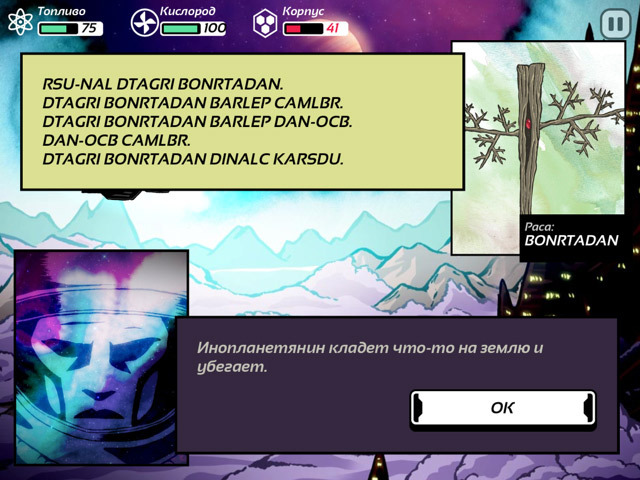
A very cool system of communication with newcomers and learning new words: you need to decipher their speech again in each batch.
Total - with all the beauty, the game is unlikely to become mass. Hardcore should be supported by visible progress, and here from the progress only the new ship and victory. Plus, completely childish problems with the fact that you can forget the diagrams of the modules - and everything for which you tried the last five systems will go.
Both games are hardcore, in both games, failure means a new start (even if you’ve almost finished the game) - but the sensations are completely different. In FTL failure, you have a new achivka and, often, a new ship. In an OT failure, just the same for replay.
Galaxy trucker
This game has become a huge pleasant surprise for me, because you need to be able to transfer the desktop so organically. The general principle of the board game is that you collect a ship from poorly joined sewer parts, then fly along the explored route and encounter various adventures. Here is my review of the desktop in the same GameDev-hub.
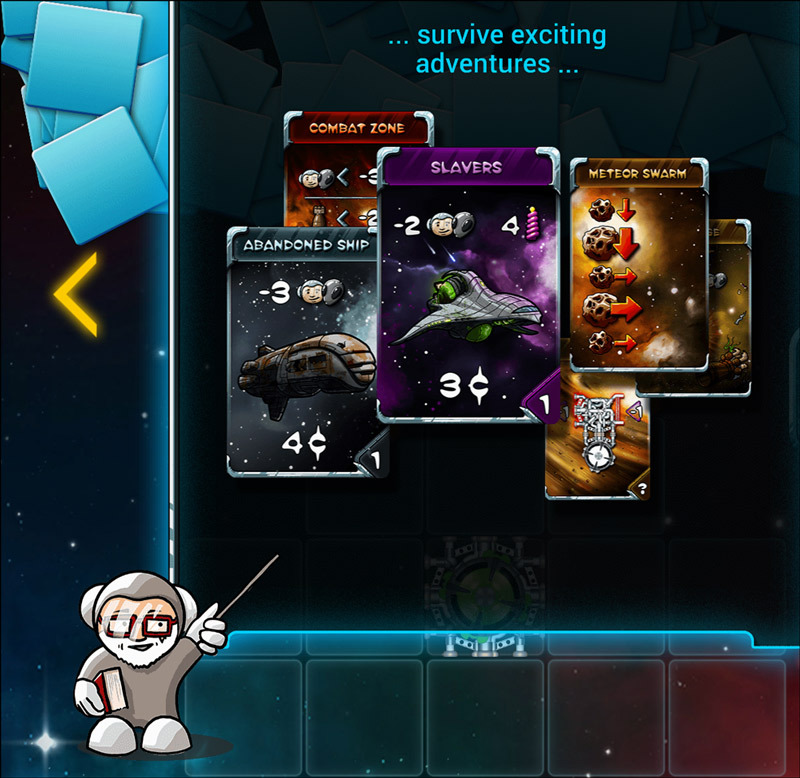

As is clear from the gameplay, it all ends on one flight. That is, they transferred their ship between the systems - and that’s it, you can count points. I literally imagine how the developers of the plot of the tablet version came to the conclusion:
- They built a map of the galaxy. Each flight is a separate mission with its own characteristics. For example, the first route is the choice between passing through an asteroid field or a boring journey to the space bar. This variety, but it can be obtained in the desktop.
- Flights provided additional conditions: somewhere a bet on who will come first, somewhere - escort a truck, transportation of heavy loads, radioactive isotopes on board, and so on. Also not the strongest step, but necessary for the plot.
- Added a global storyline. This is the most important thing: the plot has become one of the two most important measures of progress. You gradually open the galaxy map, gradually get new ship designs, new licenses for classes II and III, unblock brown and purple aliens, plus just study the world around you. Each successful flight moves you in the plot or gives you something for the ship (and this despite the fact that the ships are going from scratch every time even for a small trip)!
- Added money. This is also very important: despite the fact that the ship is new every time, you need something that shows overall success. Money after the flight does not go anywhere, but they are saving up for you. At first, they buy higher-class licenses; later they can be used for quick trips. Plus, they are sometimes needed in the plot. But the most important thing is that after completing any flight, you know that its result is at least a couple of coins in your account. And that means you flew for a reason, and it is very warm.
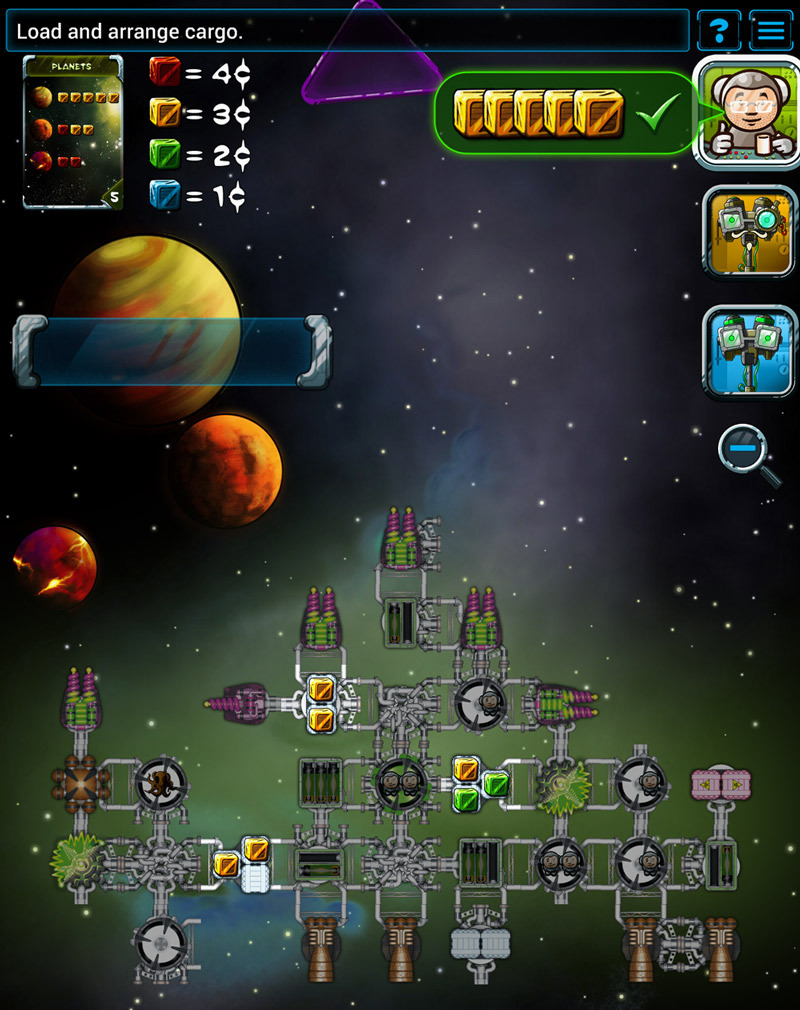
And they poured it all on top with a carbonic humor. If in FTL the characters of the dialogues were more focused on the situation in the spirit of the classic NF, in the OT the dialogue system was aimed at deciphering (nobody could say anything fundamentally new), then in GT dialogs are classic RPG dialogues. True, with features.
Special features
One of the most difficult problems of transferring the desktop to the application is getting rid of game conventions. For example, in FTL it is impossible to fight at once with two ships, in the new XCOM - maximum two items per fighter, and so on. GT developers made a beautiful feint with their ears and put all these conventions together.
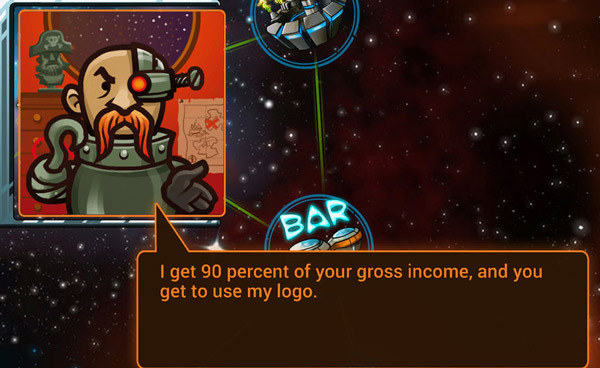
This is the usual level of dialogue for such games.
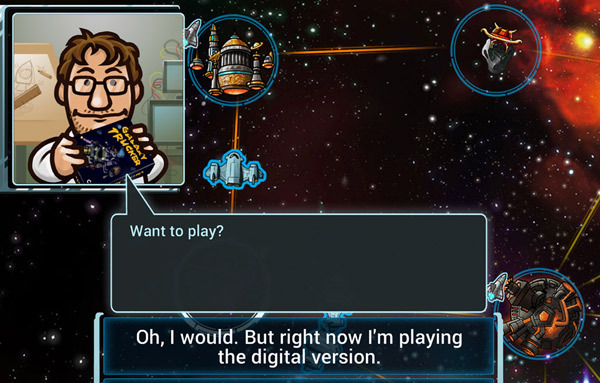
This is a researcher of the Corporation Corporation - he is going to go back in time to make a desk based on the main race of truckers. He holds our box in his hands. The same guy tells why you can hear the asteroids and who the main character of the game should look like. He also figured out how to avoid a temporary paradox - a butterfly is sent to the past together with you.

And this is an example of lawlessness - the alien apologizes for the fact that he is not in the basic version, so the ship will not take it.
Plus, there is a sea of banter about “Where is my reward, Johnny?” - “Well, keep the progress” and other jokes in the spirit: “You will never beat me!” - “And you cannot fight one-on-one in a game!” - “ Ehhh ... then I give up. " Special mention deserves the mission of the Corporation to confirm the membership in the club of truckers - it cruelly shoots out the typical gameplay, bringing the game into a kind of metagame (that's not spoiler).
All this together covers all the necessary types of players: someone will be dragged from the plot, someone will aim at the passage of the campaign, someone will enjoy the earnings, someone will just play because he knows the board. The result is a large variety of events in each system from dialogues and achivok to special flights. Again, each step gives visible progress.
The practice of the "receive" approach
So, try to find in your game those places where players lose something, and see if it is impossible to turn them into something more positive as a result of superposition.
An example . In the economic game that we somehow brought, it was like this: you have 100 coins at the beginning, you lose 10 turn each time the factory starts. After 5 moves you start getting 15 coins per turn. It is logical to just take and throw out this initialization sequence: you have a factory and 50 coins, and you start to receive 5 per turn.
Next, find all the places where the gameplay resembles pharming - and make the result a bit unpredictable in anticipation of something pleasant. If this is pulling out cards - diversify their composition so that “breaks” appear - strong events that change the course of the game for one of the players. Or random events and meetings with strange results. Or a sharp plot twists (as in Bioshok, for example). Either the possibility of unexpectedly finding something new in the game world and playing with it (for example, the constant progress of technology). Again, returning to the new XCOM - look at the serezsessirovannuyu chain of missions: on each you are waiting for a new weapon or a new ability, on every second - a new type of plate or enemy.
In general, the game is killed only two things - the negative consolidation, when the correct game action does not cause expectations of something good, and boring pharming. Both of them, as shown above, can do with the generation of positive expectations. In the end, all this leads you to the concept of the “high point” (here I wrote about it in more detail).
Well, look at your favorite games and think about what makes you play them further - why does your brain give a command to the body: “We did it right and well”?
Source: https://habr.com/ru/post/241421/
All Articles